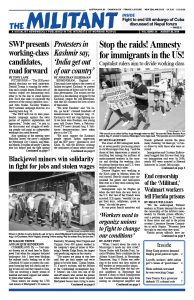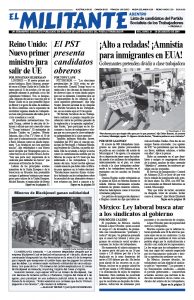In the worst ever Ebola virus outbreak in the Democratic Republic of the Congo, some 1,800 have died and at least 2,700 people have been infected with the disease in the past year. The spread of the outbreak is exacerbated by the wretched conditions confronting millions of working people and the impact of wars waged by rival forces fighting to control the exploitation of the country’s resources and peoples.
The virus is spread by contact with bodily fluids of those infected and contaminated objects.
The first cases were reported Aug. 1, 2018, in North Kivu province, a densely populated area riven by numerous military clashes, including a major assault since January by troops of the capitalist government of Congo President Felix Tshisekedi against the Allied Democratic Forces, which has links to jihadist groups.
The North Kivu and Ituri provinces — the focus of the epidemic — have been centers for almost 100 armed groups since the 1996-97 and 1998-2003 civil wars fought between government forces and opponents over control of land and mineral wealth.
More than a million people have been displaced in North Kivu, with thousands fleeing burned-out villages.
Doctors Without Borders has withdrawn from its Ebola treatment centers in the North Kivu cities of Butembo and Katwa. The group reported that steps by the army and cops to coerce people into complying with government health measures have contributed to people’s distrust of receiving treatment.
The current outbreak is now the second worst since more than 11,000 people died in West Africa, 2014-16. The callously inadequate response of the world’s leading capitalist powers to that epidemic ensured the death toll was so high. Currently, the U.S. Centers for Disease Control and Prevention has a mere 15 health care workers deployed in the Congo.
This is the 10th outbreak of Ebola in that country over the last 40 years. The current epidemic was declared an international health emergency by the World Health Organization July 17. Reflecting their disregard for those affected, government authorities in Congo had pressed WHO not to make such a declaration, claiming it would “hurt the economy,” reported The Associated Press.
Despite statements by pharmaceutical companies touting their development of Ebola vaccines, only some 163,000 people have been vaccinated in the country since 2018. The experimental vaccine produced by Merck “is effective” but “in relatively short supply,” reported BBC News Aug. 2. More than 71 million people live in Congo, the fourth-largest population in Africa.
“Given the limited amount of vaccine that’s available,” Dr. Daniel Bausch, director of the United Kingdom’s Public Health Rapid Support Team, told NPR Aug. 1, “I think we should be prepared for a long outbreak that will still go on for many months or years.”
Infection and progression of the disease is exacerbated by the fact that three-quarters of the population, especially in rural areas, have no access to safe drinking water or sanitation even though the Congo has over half of Africa’s water reserves.
During the Ebola epidemic in West Africa, the revolutionary government of Cuba acted rapidly sending 265 volunteer doctors and nurses to treat the disease. This was in marked contrast to the tardy and paltry response of the world’s wealthiest capitalist nations, whose governments seek to maximize profits, not extend human solidarity.

